Key takeaways:
- Understanding various types of music licenses is crucial for artists to protect their work and unlock opportunities.
- Clear communication and agreements are essential to avoid misunderstandings and ensure a smooth licensing process.
- Music licensing fosters collaboration and respect within the industry, supporting artists’ creativity and recognition.
- Navigating international licensing laws and changes in the industry requires thorough research and adaptability.
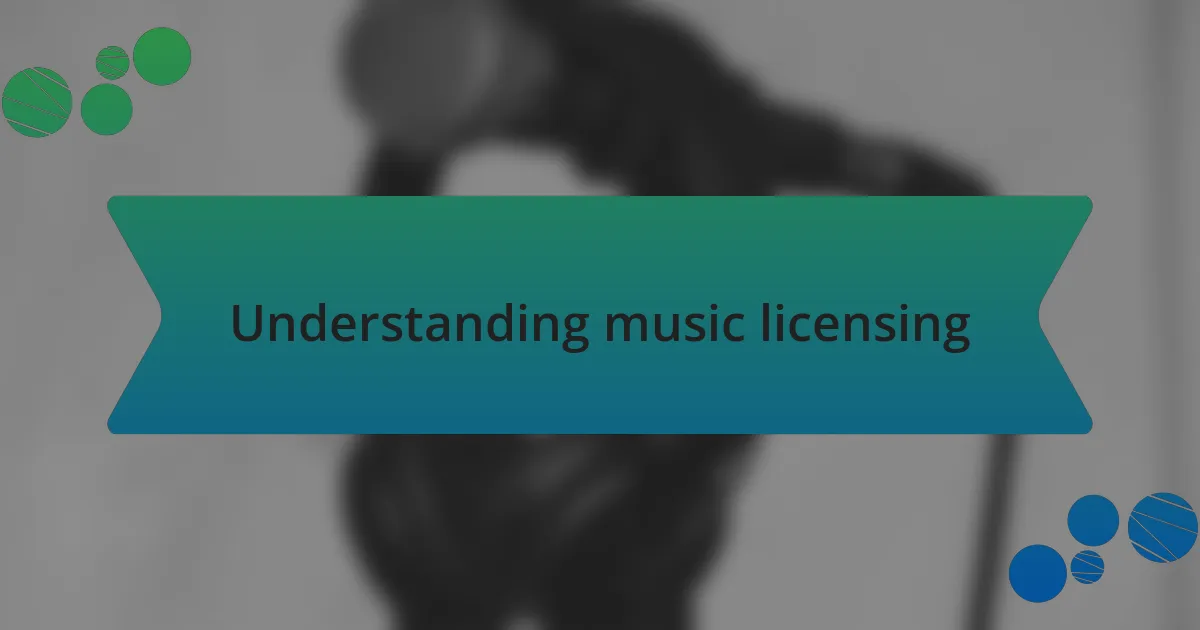
Understanding music licensing
Music licensing can feel overwhelming, especially if you’re just starting out in the electronic music scene. I remember my first experience dealing with licenses; I felt a mix of excitement and anxiety. Understanding the fundamentals of licensing, particularly how tracks can be used in various media, is crucial for any artist.
When I licensed my music for a short film, I quickly learned about the importance of rights and permissions. I had to navigate through different types of licenses, including sync licenses, which allow the music to be used in film and television. It was eye-opening to see how proper licensing can not only protect artists but also open doors for new opportunities.
Have you ever wondered why licensing is essential for musicians? Well, it ensures that creators are compensated for their work, something that resonates deeply with me as an artist. Understanding these concepts not only empowers you but also helps you appreciate the broader context of music as a business, where every beat and note has its unique value.
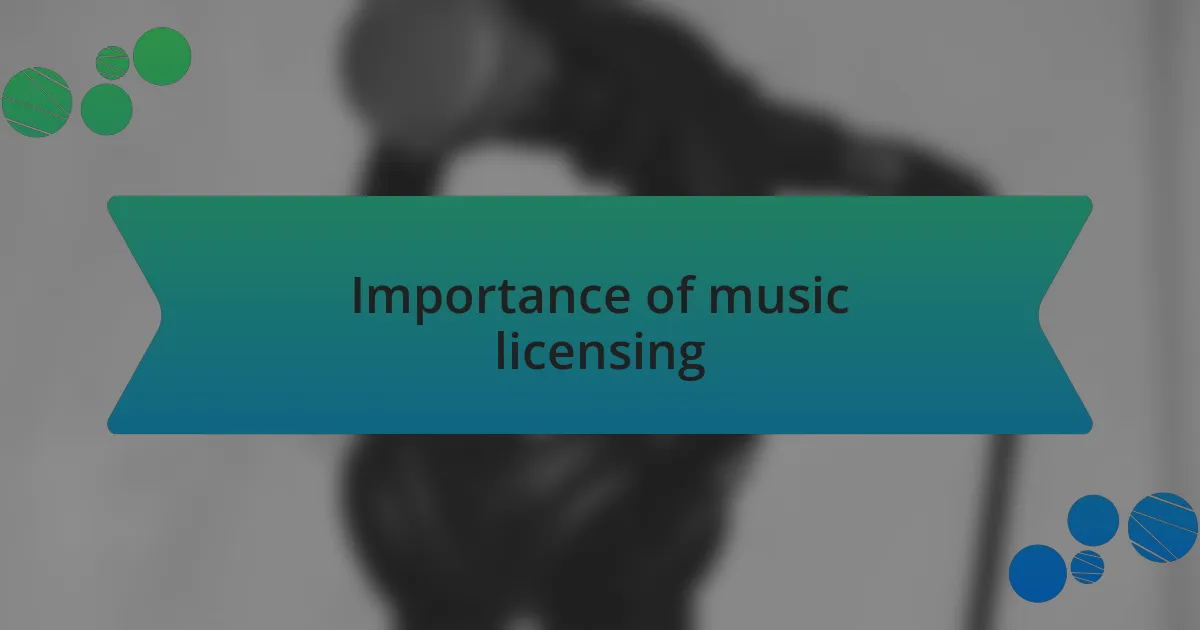
Importance of music licensing
When I first embarked on my journey in music licensing, I realized it was more than just a legal formality; it was a vital shield for my creativity. Just think about it: without proper licensing, artists run the risk of losing the rights to their work or facing legal challenges down the line. This realization hit home when I accidentally discovered a track of mine being used in an online video without my permission. The anxiety that followed made me understand how crucial it is to have clear agreements in place.
Licensing also serves as a bridge to collaboration, connecting artists with filmmakers, advertisers, and other creators looking for the perfect soundtrack. Reflecting on when I secured a licensing deal for a major ad campaign, I felt an exhilarating mix of validation and excitement. This wasn’t just a paycheck; it was a testament to my artistry being recognized in a larger context.
Moreover, music licensing fosters a culture of respect within the industry. It’s all about acknowledging the hard work and emotional investment that goes into creating each piece. Have you felt that surge of pride when you see your music credited? That’s why, in my view, licensing isn’t merely a step; it’s a cornerstone for every artist aiming to thrive in an ever-evolving landscape.
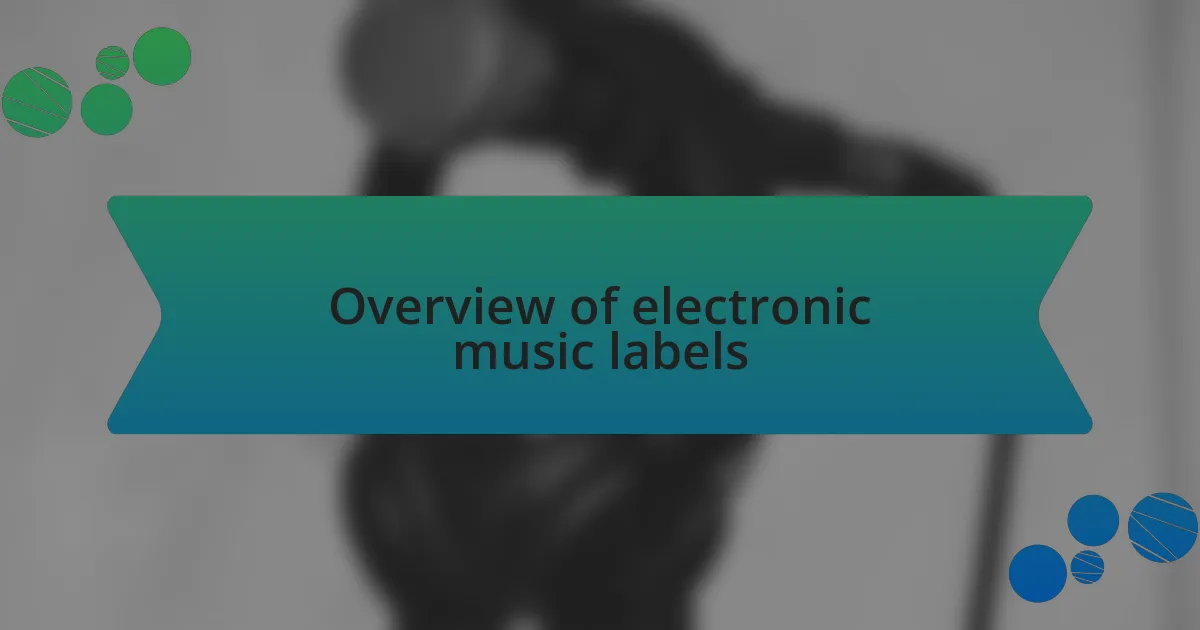
Overview of electronic music labels
Electronic music labels serve as the backbone of the electronic music scene, acting as vital platforms for artists to share their work. Having been a part of this vibrant community, I can attest to how these labels not only provide distribution but also offer essential support in marketing and promotion. They often help emerging artists find their niche and amplify their voices in an industry that can sometimes feel overwhelming.
The diversity among electronic music labels is fascinating, ranging from major ones with extensive resources to small, independent labels that cultivate unique sounds. I remember the nervous excitement I felt when I signed a track with a smaller label known for its distinct style. It wasn’t just about the contract; it was about being part of a collective that shared my passion and vision. There’s something powerful about being surrounded by like-minded creators who are equally invested in pushing boundaries.
Moreover, electronic music labels play a significant role in shaping trends and genres within the electronic music realm. It always intrigues me how labels can rally around a specific sound and influence the broader landscape, almost like curators of the industry’s evolution. As someone who has navigated this space, I’ve seen firsthand how the right label can elevate an artist’s career trajectory, fueling not only creativity but also community connection. Have you ever wondered how music labels can transform an artist’s journey? In my experience, the right match can lead to incredible opportunities and lasting connections, making the label an essential ally for any electronic musician.
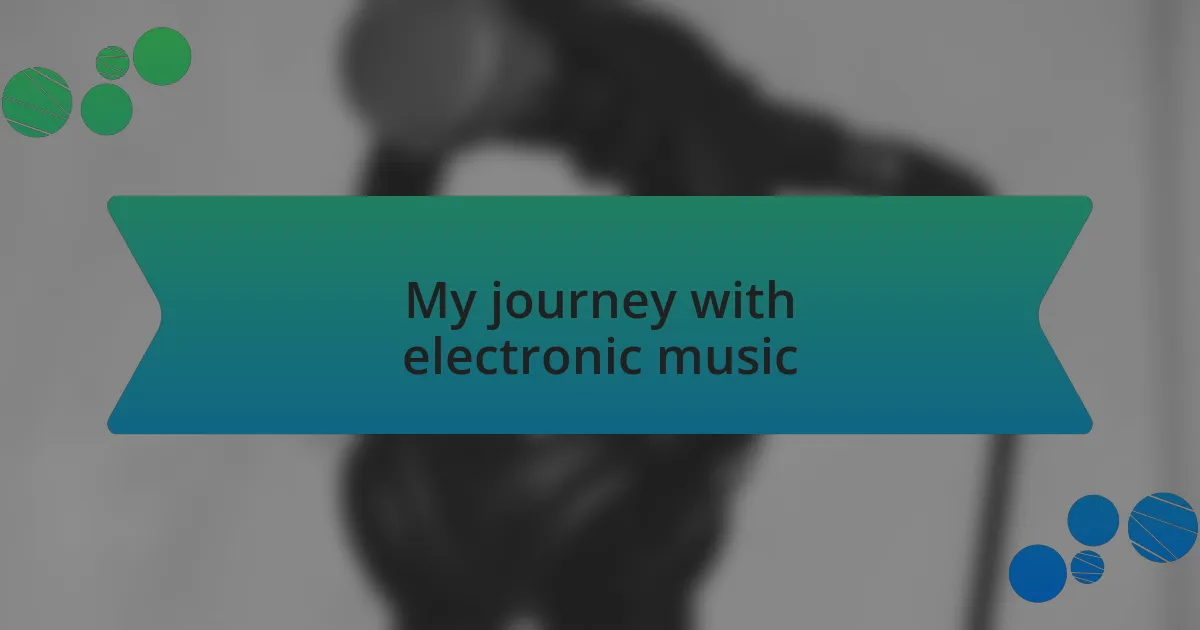
My journey with electronic music
My journey with electronic music began in my teenage years, sparked by an electrifying set at a local festival. I remember that moment vividly; the bass reverberated through my body, igniting a passion that hasn’t faded since. It wasn’t long before I found myself experimenting with production software, feeling a mix of excitement and frustration as I navigated the learning curve.
As I delved deeper into the world of electronic music, I started connecting with fellow enthusiasts online. One night, I shared a demo in a forum, and to my surprise, it resonated with listeners, leading to my first collaborative project. That experience taught me the power of community in this genre, reminding me that although the journey is often solitary, it’s the connections we make that enrich our creativity.
I still recall the anxiety before my first performance. Standing behind the decks, my heart raced, and I couldn’t help but wonder if the crowd would connect with my sound. When I dropped my lead track, the energy shifted instantly, and in that moment, I realized that sharing music is not just an act—it’s a profound exchange that transcends words. This journey has shaped my understanding of what it means to create and share within the electronic music space. Have you ever felt that rush of connection through music? It’s those moments that keep me inspired to push boundaries and experiment further.
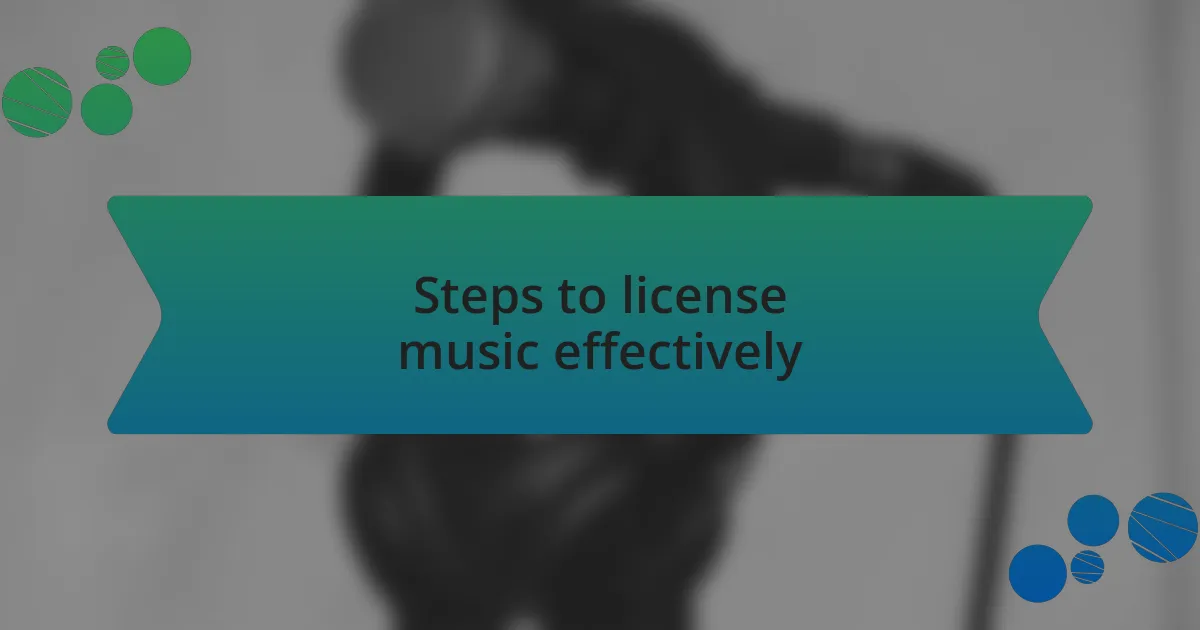
Steps to license music effectively
When it comes to licensing music effectively, the first step is understanding the different types of licenses available. For instance, I learned early on that a synchronization license is vital for placing music in film or television, while a public performance license is necessary for playing my tracks in venues. Have you ever thought about how the right license can open doors for exposure?
Next, I realized the importance of drafting a clear agreement with all parties involved. Ensuring that everyone understands their rights and responsibilities helps prevent misunderstandings down the line. In my experience, the more transparent the communication, the smoother the process. That’s why I always recommend negotiating upfront, especially if you’re collaborating with other musicians or producers.
Finally, keeping abreast of industry trends and legal changes can significantly aid in staying compliant. I remember a time when a particular licensing shift caught many artists off guard, resulting in confusion and missed opportunities. I’ve found that subscribing to industry newsletters or joining musician forums keeps me informed and ready for whatever changes come my way. Have you ever felt a sudden shift in your creative landscape because of unforeseen rules? Staying informed can help mitigate those surprises and keep your music career thriving.
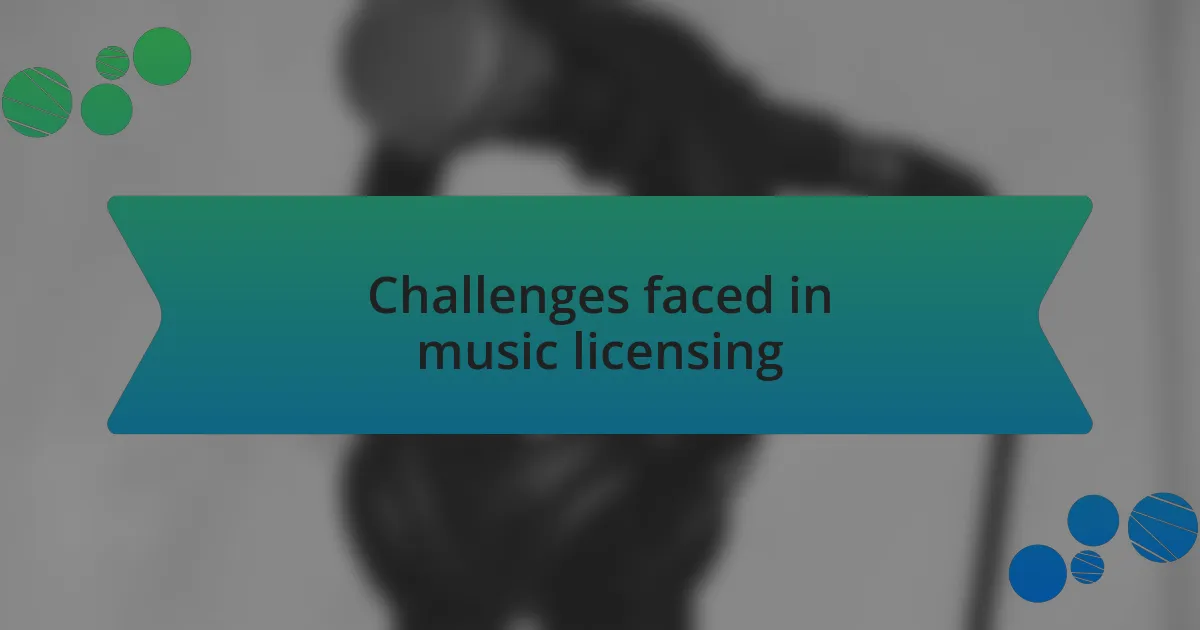
Challenges faced in music licensing
Navigating the world of music licensing is often more complex than I initially anticipated. For instance, I once found myself in a tangled situation over a song I used in a promotional video. I didn’t realize that the licensing arrangement I’d assumed was in place actually only covered live performances. Have you ever overlooked the fine print only to face the consequences later?
Another challenge I faced was dealing with varying licensing laws across different countries. When I tried to license one of my tracks for an international release, I quickly discovered that what was acceptable in one region might not be in another. This can be frustrating, especially when you’ve invested time and energy into a project. It made me realize the importance of researching local laws thoroughly – a step I now treat as non-negotiable.
Lastly, the timeline for securing licenses can be unexpectedly long. I remember waiting weeks for a response regarding a crucial sync license, during which I felt a mix of anxiety and impatience. It taught me that patience is key but also highlighted the necessity of starting the licensing process as early as possible. Have you ever found yourself in a time crunch due to licensing delays? It’s a situation most creators want to avoid, but it can happen if you’re not proactive.

Lessons learned from my experience
One significant lesson I learned is the value of clear communication. Early in my licensing journey, I assumed that asking for permission to use a song was enough, but I quickly realized that outlining the details was crucial. I had a case where an agreement fell through because the other party felt uncertain about my intentions. It was a wake-up call: are we all truly being as clear as we think we are?
Embracing flexibility has also proven essential. I vividly recall a time when a licensing deal I was banking on fell apart at the last minute. At that moment, I had to pivot quickly, searching for alternative solutions while maintaining the integrity of my project. This experience taught me that adaptability is just as vital as planning. How often do we cling to our original vision, even when circumstances change?
Lastly, I’ve learned the importance of fostering relationships in the industry. I gained invaluable insights just by attending conferences and chatting with other artists and label owners. It struck me that many of us are sailing in the same boat, and sharing experiences not only builds camaraderie but can also lead to unexpected collaborations. Have you ever discovered a key connection that helped you navigate a tricky situation? I certainly have, and those connections can make a world of difference in the complex landscape of music licensing.